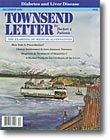


December 2002
by Alan R. Gaby, MD

Recently, the media focused attention on a study published in the Journal of the American Medical Association indicating that ginkgo does not improve memory in elderly individuals. "Forget the ginkgo" was the headline that appeared on one of the television news programs. A few days later, the same network kicked off its news program with a statement from a panel of "experts" that herbs don't work at all.
My own review of the JAMA study revealed that the media reports did not present the complete story. The key point that was left out was that the study participants had good cognitive function at the start of the study, and therefore had little or no room for improvement. One of the criteria for being accepted into the study was a score of greater than 26 (out of a possible 30) on the Mini-Mental State Examination (MMSE). Individuals who score 24 or higher on this test are considered to have normal cognitive function, and the mean MMSE score among the study participants was 28.75. Therefore, all the JAMA study showed was that ginkgo does not make sharp people sharper. That finding is not particularly newsworthy, and it certainly does not negate the many studies showing ginkgo is beneficial for people with impaired cognitive function. Ergo, "forget the ginkgo" was a misleading sound byte.
The other major "news story," that herbs don't work, was the conclusion that came from a meeting of unnamed "experts" whose affiliations and conflicts of interest were not disclosed. Nor was any specific evidence presented in the news report to support the claim that herbs don't work. Nevertheless, the media was somehow persuaded to run a propaganda story as if it were science.
Who is behind these one-sided press releases that are so readily taken up by the news media? Candace Campbell, the Executive Director of the American Association for Health Freedom (formerly the American Preventive Medical Association) told me she was at a seminar a few years ago when one of the speakers started bragging about how his organization, the American Association of Pharmaceutical Scientists (AAPS), was behind some of the stories claiming that nutritional supplements are dangerous. AAPS had apparently hired an expensive New York public-relations firm for the specific purpose of making nutritional supplements look bad. While it is not clear to what extent the drug industry is behind the recent herb-bashing stories, it would not be surprising if they were being fed to the press by some group that is threatened by the increasing popularity of natural medicine. It is important to recognize that creating bogus stories to convince people not to use safe and inexpensive supplements (and, by implication or default, promoting dangerous and expensive drugs) can lead to widespread deterioration of both the physical and financial health of our population.
Why is the press so easily suckered into promulgating such stories? Reporters typically do not have the expertise to second-guess the supposedly scientific information they receive. However, they do have the option to seek opposing opinions. Perhaps the press does not know to whom to turn for a second opinion on natural medicine. It is therefore imperative that we develop the capability to provide a rapid and accurate rebuttal to the blather that continually appears in both the media and in some medical journals.
I would suggest that The American Association for Health Freedom (AAHF) is in a unique position to provide such a service. Many of the members of this organization are experts in natural medicine and would be available on short notice to speak to the press or provide a written statement. AAHF already has experience working with the press, but needs additional funding to set up and maintain the "rapid-strike capability" that is needed to provide the media with fair and balanced stories. Contributions to the Health Freedom Foundation (a fund-raising arm of AAHF) are tax-deductible. For further information, please contact Candace Campbell at 1-800-230-2762.

Search
our pre-2001 archives for
further information. Older issues of the printed magazine are also indexed
for your convenience.
1983-2001
indices ;
1999-Jan. 2003 indices
Once you find the magazines you'd like to order, please use our
convenient form, e-mail subscriptions@townsendletter.com,
or call 360.385.6021 (PST).
All rights reserved.
Web site by Sandy Hershelman Designs